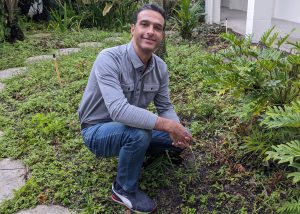FORT LAUDERDALE, Fla – When it comes to soil, Abolfazl “Abi” Hajihassani can give South Florida growers the scoop nematodes and more.

As the newest member of UF/IFAS Fort Lauderdale Research and Education Center, the assistant professor of nematology is all about South Florida soil and the microscopic roundworms that wreak havoc on its crops and plants. His research focuses on new ways to control them safely and effectively on ornamental plants and the fruit and vegetable crops that thrive in South Florida.
“The goal of my research here in South Florida will be to develop multiple nematode control tools to help growers, producers and end-users,” Hajihassani said. “Fort Lauderdale is where I can expand my research by working on different crops and nematodes and help producers and growers in the region who may not be aware of nematodes that are ‘hidden enemies.’”
Hajihassani will also collaborate with other scientists who research tropical fruits, ornamentals, turf, vegetables like lettuce, and some row crops including rice, sugar cane and corn.
“In the first year, I plan to conduct surveys to understand what groups of nematodes are present in South Florida’s soils causing damage to different crops. This will help us design management practices to control nematodes of economic importance,” he said.
Hajihassani comes to us from University of Georgia, where he served as assistant professor for the last five years in plant pathology. His research was focused on nematode of vegetable crops like onions, bell peppers, tomatoes, cucumbers and many more.
Florida’s ornamental plant industry ranks second nationally only to California, with total direct economic contributions estimated at $29.8 million, according to the USDA. Florida is ranked first in the Southeastern U.S. Florida’s tropical fruit industry includes about 13,000 acres of farmland with an economic impact of over $100 million annually.
-30-
The mission of the University of Florida Institute of Food and Agricultural Sciences (UF/IFAS) is to develop knowledge relevant to agricultural, human and natural resources and to make that knowledge available to sustain and enhance the quality of human life. With more than a dozen research facilities, 67 county Extension offices, and award-winning students and faculty in the UF College of Agricultural and Life Sciences, UF/IFAS brings science-based solutions to the state’s agricultural and natural resources industries, and all Florida residents.
ifas.ufl.edu | @UF_IFAS
 0
0
